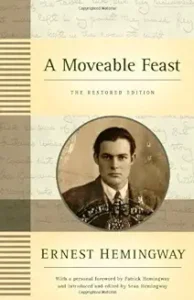A Moveable Feast: The Restored Edition by Ernest Hemingway 1964 (2009)
I had read Hemingway’s book at least three times previously, but never in Paris, and this reading felt completely different than the prior ones. Rather than the Paris locale, I think it was this particular edition of the book that felt so different. The book was labeled “The Restored Edition” with a Foreword by Patrick Hemingway (son) and an Introduction and Acknowledgements by Sean Hemingway (grandson). Those additions made it clear that this posthumous publication in 1964, one year after Hemingway committed suicide with a shotgun in Ketchum, Idaho, is not without its contrversies. Apparently, Hemingway never finished this manuscript leaving it without a title, chapter headings, an introduction or conclusion and even some uncertainties about what order the chapters should be in. His grandson has made the editorial decisions about these matters, and the resultant edition feels different from the earlier ones I had read.
This edition retains the wonderful writing Hemingway did in recollecting the times in the 1920’s when he and his new wife, Hadley were in their own twenties. Writing in cafes or in his fifth floor hotel room, hanging out with Gertrude Stein and F. Scott Fitzgerald, benefiting from the generosity of Sylvia Beach and her Shakespeare and Co. lending library, keeping Ezra Pound and Evan Shipman company, spending the winters skiing in the Austrian Alps, drinking and eating well on a few francs/day—these are all wonderfully recounted, but the overall tone is one of sadness, loss, and the word he repeatedly uses to reference his abandonment of Hadley and marriage to Pauline, remorse. The reality of the Lost Generation, a term he credits to Stein who evidently heard it from a garage owner in reference to a mechanic who didn’t want to work very hard, is that it was not all fun and games or gaiety. It’s a lost time as well as a lost generation, as Paris 100 years later bears little resemblance to Hemingway’s city.
Nonetheless, I loved his writing—boiled down, plain, simple, terse—and I still think it would have been exciting and wonderful to live here in between the wars and before the Depression started the downward spiral ending in WWII. I’ve been fascinated with Hemingway forever, perhaps because he went to the same high school that I did but mostly because of his fiction. In recent years, I’ve reread ‘The Sun Also Rises,’ ‘A Farewell to Arms’, ‘For Whom the Bell Tolls’, and ‘The Old Man and the Sea’. I don’t think many authors have a body of work that has held up so well over the years. A tragic ending and as comes through in this book, a pretty tragic life for a great writer.



